Max Bruch · Moses
Track
M O S E S
German Oratorio Op. 67 in Four Parts,
performed by Peter Lika (Bass), Birgitte Christensen (Soprano),
Stefan Vinke (Tenor), the Maulbronn Cantor Choir (Kantorei Maulbronn)
and the Russian Chamber Philharmonic St. Petersburg
Conductor: Jürgen Budday
A live recording from the church of the German
UNESCO World Heritage Site Maulbronn Monastery
HD Recording · DDD · Duration: 120 Min. 55 Sec.
Digital Double Album · 15 Tracks
MP3 Album
320 kBit/sec.


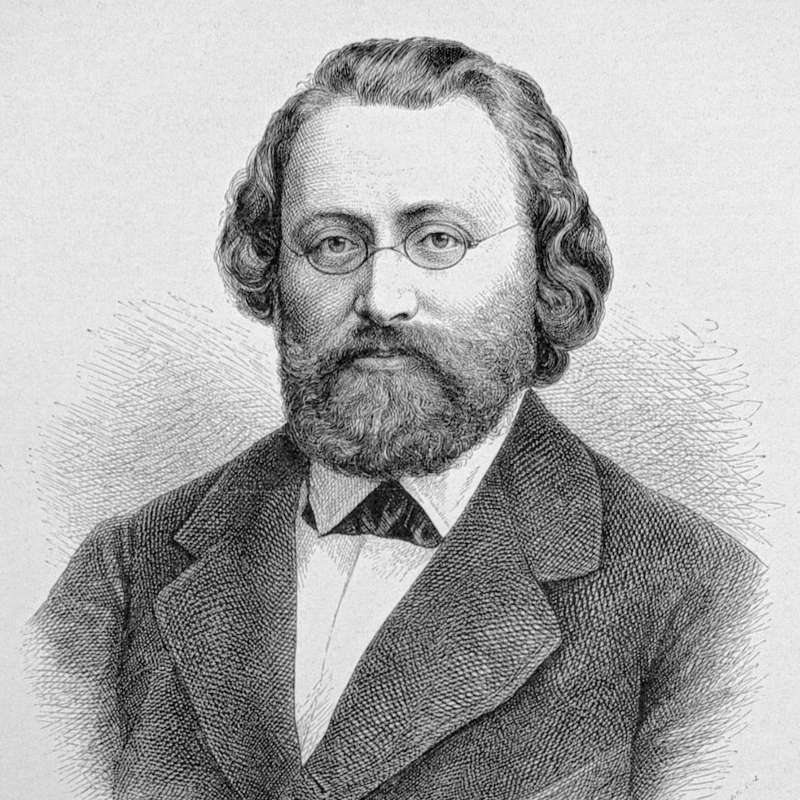
T
he oratorio Moses holds special meaning in composer Max Bruch's body of work. He originally viewed it presumptuous to continue in the tradition of the major works by Händel and Mendelssohn. In a letter to the music writer Hermann Deiters he wrote in 1873: "Biblical subject matter is foreign to my nature; the old masters have made such formidable contributions in this area so that it is only possible for us to make independent and new accomplishments in conjunction with other subjects. It is no coincidence that every oratorio since Mendelssohn has been a failure." Whatever it was that ultimately triggered Bruch's change of mind remains a mystery, but in 1893, he wrote to the Bach researcher Philipp Spitta, the brother of his future librettist Ludwig: "You are the first, and will, for the time being, be the only person I trust to disclose a plan that so vividly occupies me. Do you wish to read intently the composition, the poetic foundation of a large-scale oratorical work: ‘Moses at Sinai' (or Israel in the Desert)... long have I sought and groped, momentarily pondering this, and then that. Because I am bound and determined to not further enhance the drama of the worldly dramatic cantata... which is why I have returned to the enclosed, truly oratorical plan, with which I was already seriously occupied in 1889, and again in 1890. It begins where Händel's ‘Israel in Egypt' ended. As far as I can conclude, no other musician of relevance has ever addressed this part of Moses' history…"
Conducted by Bruch, the debut performance was finally held on the 8th of January 1895 in Barmen. It is a piece of early oratorical art that Bruch has created here, yet one that is cloaked in the era of the Late Romantic. The choir is the decisive mediator of events in the piece of work. In addition to delicate poetic expression, the dramatic impact also demands particularly creative agility and adaptation from the singers. Even Bruch's contemporaries were suspicious of the opus.
In June 1895, Johannes Brahms wrote to Clara Schumann: "Bruch has now published a Moses... If only one could feel a hint of joy in the stuff! They are weaker and worse than his own early works in every respect. The only good sentiment is when one feels inclined, as I do, to thank the Lord that he spared us of the sin, the vice, or the bad habit of mere score-writing." Bruch, on the other hand, saw himself affirmed in his work and wrote to his publisher Franz Simrock in February of 1895: „I want to tell you a secret: noble and ample effects on thousands are not to be attained by common means; something higher, which cannot be defined, is working from within the productive artiste... I could have not have written ‘Moses' had not a strong and deep feeling of divinity been alive in my soul, and every deeply insightful artiste will have experienced that once in his life, so that through the medium of his art, he can proclaim to the people the best and innermost emotions of his soul... And in such, Moses proved to the world that I did not stand still – as that is the most potent danger in older age."
The oratorio so powerful and atmospheric in its choruses and arias consists of two parts and presents four episodes from the life of the prophet Moses. Part one of the opus begins with a short, dramatic introduction.
The scene At Sinai depicts Moses as the leader of the Israelites. He is called to the mountain by an angel to receive the Ten Commandments from Jehovah. During his absence, his brother Aaron is designated as keeper of the people. The Sanctus beginning with Psalm 90 of both solo parts of Moses and Aaron in alternation with the people was a core part of the opus for Bruch.
In the second scene, The Golden Calf, the plot makes a wide bend, heading towards the oratorio's tragic conflict, the Israelites' digression from Jehovah. Three impulsively scored chorus scenes portray the chosen people's restlessness and doubt caused by the prophet's long absence. The crude demand made of Aaron to produce a golden calf as a visible idol culminates in the anger of Moses, who has returned and calls to order the Israelites who are dancing around the false god Baal.
Part two (episode three), The Return of the Scouts from Canaan, begins in the middle of the conflict between Moses and the Israelites. The scouts Moses has sent to the Promised Land bring back hymnic reports of the "land of dreams", but the prophet deems the people of Israel unworthy of the Promised Land. Aaron and the Israelites arrive at deeper insight: "oh Lord, help us find mercy". A depiction of the fight with the Amalekites then follows.
In the last episode, The Promised Land, the Lord's angel proclaims to Moses his approaching end. The prophet leads his people to the Nebo Mountain where a view of Canaan is granted. Moses blesses the Israelites here before he passes away.
A concert recording from the church of the German UNESCO World Heritage Site Monastery Maulbronn,
recorded, released & created by Andreas Otto Grimminger & Josef-Stefan Kindler.
Sound & Recording Engineer: Andreas Otto Grimminger.
Mastering: Andreas Otto Grimminger & Josef-Stefan Kindler.
Photography: Josef-Stefan Kindler.
Artwork & Coverdesign: Josef-Stefan Kindler.
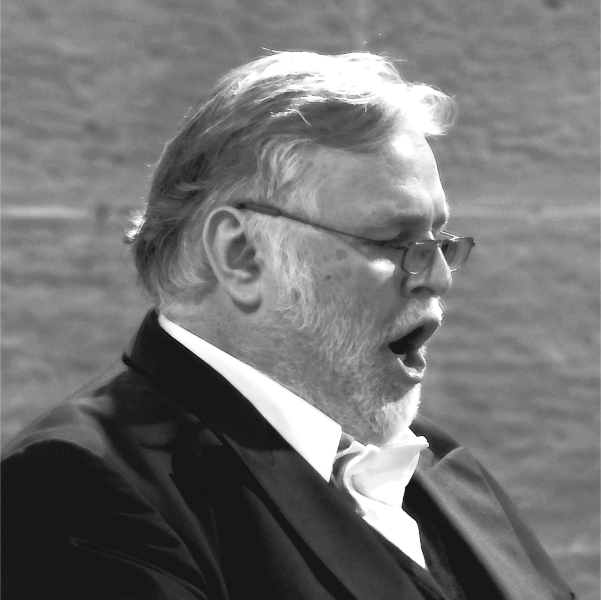
Peter Lika ~ Bass (Moses)
Peter Lika began his singing career as a soloist in the boys' choir Regensburger Domspatzen and is considered one of the leading bassists in the concert and opera circuit. Paired with a finely balanced, dramatic expressiveness, his unmistakable timbre makes him a predestined soloist for roles such as that of the prophet Moses. Conductors like Masur, Schreier, Rilling, Gardiner, Marriner, Norrington, Celibidache or Herreweghe appreciate working together with Lika, as do renowned international orchestras, not least due to his extensive repertoire and also his longstanding experience with early music. Performances with the Gewandhaus Orchestra of Leipzig, the Bamberger Symphonic, the Chicago Symphony Orchestra, the Israel Philharmonic Orchestra and nearly all German broadcast orchestras have led Lika to the major musical centres of Europe, Asia, and USA. Finally, song programmes are also part of Lika's repertoire; with Sawallisch, he has recorded Schubert's vocal epos among other things.
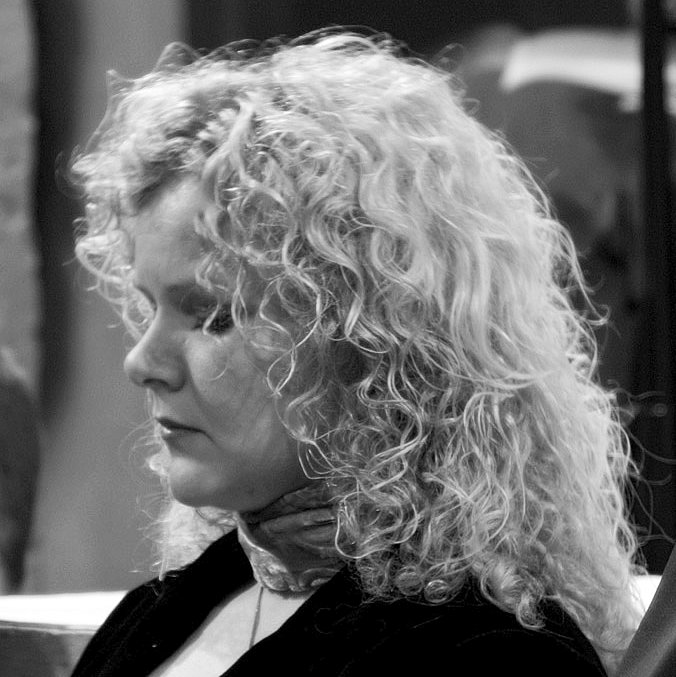
Birgitte Christensen ~ Soprano (Angel of the Lord)
Birgitte Christensen was born in 1972 in Norway. She concluded her vocal training in 1997 at the state conservatory in Oslo. In November 1998 she made her extremely successful debut at the Norwegian National Opera as the Queen of the Night and was distinguished with the prestigious Esso award for outstanding opera performances. Since December 1999 she has been engaged by the Innsbruck Theatre where she has sung the main role in Händel's Partenope, Liu in Turandot and the Queen of the Night. In June 2000, she received a grant for her part in Partenope and was awarded the Eberhard Wächter medal.
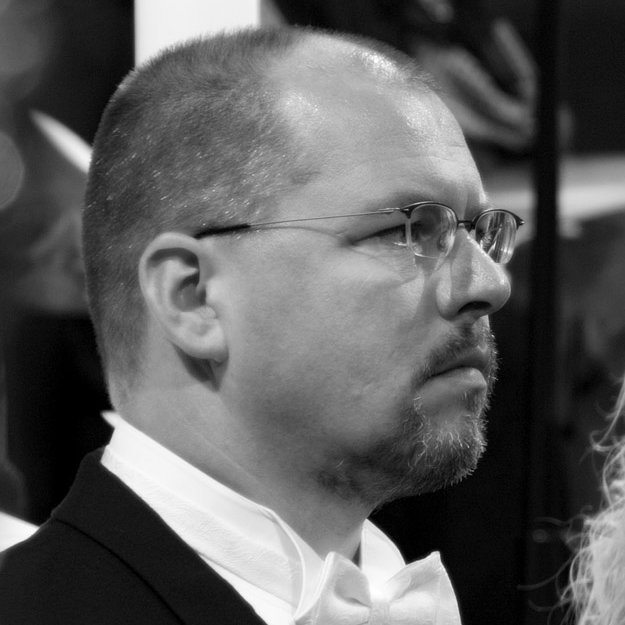
Stefan Vinke ~ Tenor (Aaron)
Stefan Vinke was born in Osnabrück and studied song with the court singer Edda Moser in Cologne, and with Eugene Kohn. The accomplished church musician received his first engagement at the Karlsruhe State Theatre of Baden in 1993. He sang for two seasons here before switching to the Krefeld-Mönchengladbach Theatre. Jun Märkl engaged Stefan Vinke for the 1999/2000 season as the 1st youth heroic tenor at Mannheim's National Theatre. In the new Ring, Stefan Vinke sings the role of Siegmund, followed by Lohengrin, Parsifal, Florestan and Tristan.
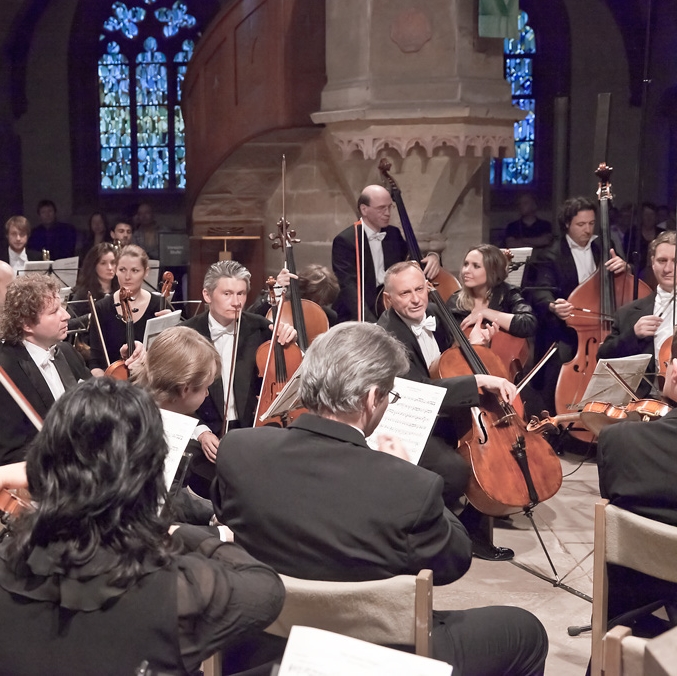
Russian Chamber Philharmonic Orchestra St. Petersburg
The orchestra was founded in 1990 by graduates of the St. Petersburg Rimsky-Korsakoff Conservatory. The tours with Mstislav Rostropovitch, Igor Oistrakh, Mikis Theodorakis, Nina Corti and Giora Feidman as well as with opera and ballet soloists of the Moscow Bolschoi Theatre and the St. Petersburg Mariinski Opera attracted international interest. Performances in the cities of Paris, Rome, Madrid, Amsterdam, London, Frankfurt, Munich and Leipzig as well as at various festivals testify of the orchestra's exceptional status.
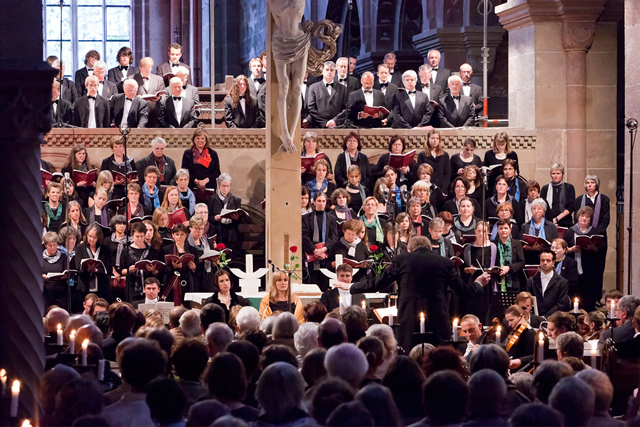
Maulbronn Cantor Choir
The Maulbronn Cantor Choir (German: Kontorei Maulbronn) is the large oratorio choir of the monastery in Maulbronn. The choir was founded in 1948 as a federation of the Evangelic Church Choir Maulbronn and the choir of the Evangelic Seminar Maulbronn. In this tradition the choir is formed today with ambitious choral singers from the region and students and former students of the Seminar Maulbronn (gymnasium with boarding school). Over those many years of its existence the choir has performed the complete repertoire of popular oratorios and worked together with orchestras like the 'Southwest-German-Radio-Symphony-Orchestra Baden-Baden and Freiburg', the 'Central German Chamber Orchestra', the 'Southwest German Chamber Orchestra Pforzheim' or the 'Baden Philharmonic Orchestra'. Soloists of these performances were artists like Barbara Schlick, Maya Boog, Sandra Moon, Sophie Daneman, Marga Schiml, Elisabeth von Magnus, Hans Peter Blochwitz, Aldo Baldin, Marc Clear, Markus Brutscher, Peter Lika, Gotthold Schwarz and Ludwig Güttler. The German television station ZDF broadcasted a portrait about the Choir, and the choir has participated in live radio recordings for the SDR, SWR, Deutsche Welle and Deutschlandfunk.
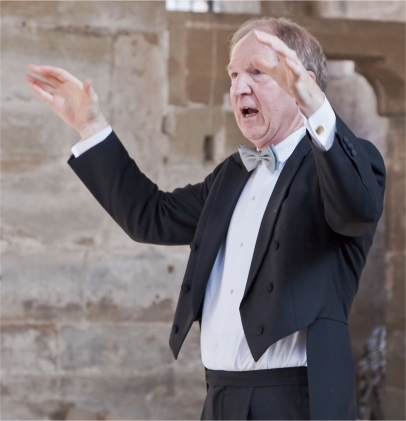
Jürgen Budday ~ Conductor
Prof. Jürgen Budday (born 1948) is conductor, director of church music, music teacher and artistic director of the concert series at the UNESCO World Heritage Site Maulbronn Abbey. He started teached at the Evangelical Seminar in Maulbronn from 1979 till 2012. This also involved his taking over as artistic director of the Maulbronn Monastery Concerts and the cantor choir in 1979. He studied church music and musicology at the Academy of Music in Stuttgart from 1967 to 1974. In 1992, he was named Director of Studies, in 1995 came the appointment as Director of Church Music and in 1998 he was honored with the "Bundesverdienstkreuz" (German Cross of Merit) as well as the Bruno-Frey Prize from the State Academy in Ochsenhausen for his work in music education. In 1983 Jürgen Budday founded the Maulbronn Chamber Choir (Maulbronner Kammerchor) with whom he won numerous national and international awards. At the Prague International Choir Festival, for example, Jürgen Budday received an award as best director. Since 2002, he has also held the chair of the Choral Committee of the German Music Council and became director and jury chairman of the "German Choir Competition" (Deutscher Chorwettbewerb). In 2008, he received the silver Johannes-Brenz-Medal, the highest honoring of the Evangelical-Lutheran Church in Wuerttemberg. Jürgen Budday was honoured in 2011 with the honorary title "Professor". In May 2013 Prof. Jürgen Budday was awarded by the Association of German Concert Choirs with the "George-Frideric-Handel-Ring" - one of the highest honors for choir conductors in Germany. Thus Jürgen Budday followed Helmuth Rilling, who was honored with the ring from 2009 till 2013.
Jürgen Budday has started a cycle of Handel oratorios that is planned to span several years, which involves working with soloists like wie Emma Kirkby, Miriam Allan, Michael Chance, Nancy Argenta, Mark Le Brocq, Charles Humphries, Stephen Varcoe (to name but a few). The live recordings of these performances, that have received the highest praise from reviewers, has won him international recognition. Till these days 11 oratorios by G.F.Handel are documented on discs.
"No conductor and no choir have so consistently recorded so many Handel oratorios as Jürgen Budday and his Maulbronn Chamber Choir." (Dr. Karl Georg Berg, Handel Memoranda Halle 2008).
Maulbronn Cantor Choir
Soprano:
Uta Albrecht, Clara Buss, Ines Darilek, Hannelore Demuth, Ulrike Egler, Gertrud Fahnenbruck, Claudia Fischer, Gretel Flasshoff, Erika Frasch, Christel Gebicke, Dörthe Glogner, Mirjam Grauli, Eva Günthner, Ute Günthner, Birgit Gutekunst, Frauke Harms, Hanna Hitziger, Andrea Klein, Gabriele Königs, Amrei Kriener, Annette Krtscha, Ursula Lang, Erika Langer, Irmgard Leins, Gerda Lemberg, Helga Leppek, Liane Matheis, Silke Mürdter, Gisela Pöthe, Lena Renkenberger, Christina Riek, Gerlinde Roos, Anna Schlimm, Nelly Schlimm, Christa Schmetzer, Amelie Spätgens, Beate Speck, Lore Stalter, Ute Troyke-Immel, Edda Ullrich, Bettina Wagner, Inge Wanner
Altus:
Verena Balcarek, Ulrike Bickel-Lang, Rosemarie Bohn, Eva-Maria Brückner, Helge Bührer, Dorothee Combe, Ulrike Egerer, Gertrud Erhardt-Raum, Doris Frank-Dietz, Barbara Fritsch, Ann-Katrin Fuierer, Dorothea Haiges-Obenland, Eva-Maria Herrmann, Dorothea Irion-Küenzlen, Christina Jungfer, Ursula Kaufmann, Stefanie Knappe-Retsch, Elisabeth Kümmerle, Angelika Kuveke, Maria Matzen-Mauch, Irmgard Miehlich, Margit Rapp, Dorothea Reininghaus, Anette Rösler, Beate Roth, Maria Smejkal, Sophie Sterzer, Ruth Weida, Helga Weber, Daniela Rosenberger
Tenor:
Wolfgang Altenmüller, Ernst-Dietrich Egerer, Jürgen Huttenlocher, Christoph Irion, Hartmut Leins, Thomas Müller, Dr.Bernhard Olt, Helmut Schmid, Harald Schroeder, Walter Toepfer, Michael Wagner, Manfred Wanner, Hans-Peter Weber
Bass:
Alfred Ankele, Dr. Reinhard Demuth, Bernhard Fräulin, Friedemann Frasch, Norbert Ganser, Kurt Glogner, Dr.med. Uwe Hage, Elmar Herkommer, Tobias Hitziger, Johannes Hruby, Stephan Irion, Christian Kloss, Ulrich Köhler, Jürgen Krug, Hans Kuveke, Hans Metzger, Wolfgang Miehlich, Hans-Martin Müller, Dr. Malte Neurath, Dr. Günther Rapp, Gottfried Retsch, Manuel Roller, Marcus Roller, Dieter Rudolf, Hans Schmid, Jan Smejkal, Jonathan Wahl
P
ublishing Authentic Classical Concerts entails for us capturing and recording outstanding performances and concerts for posterity. The performers, audience, opus and room enter into an intimate dialogue that in its form and expression, its atmosphere, is unique and unrepeatable. It is our aim, the philosophy of our house, to enable the listener to acutely experience every facet of this symbiosis, the intensity of the performance, so we record the concerts in direct 2-Track Stereo digital HD. The results are unparalleled interpretations of musical and literary works, simply - audiophile snapshots of permanent value. Flourishing culture, enthralling the audience and last but not least also you the listener, are the values we endeavor to document in our editions and series.
The concerts at the UNESCO World Heritage Maulbronn Monastery supply the ideal conditions for our aspirations. It is, above all, the atmosphere of the romantic, candle-lit arches, the magic of the monastery in its unadulterated sublime presence and tranquillity that impresses itself upon the performers and audience of these concerts. Renowned soloists and ensembles from the international arena repeatedly welcome the opportunity to appear here - enjoying the unparalleled acoustic and architectural beauty of this World Heritage Site, providing exquisite performances of secular and sacred music, documented by us in our Maulbronn Monastery Edition.
Andreas Otto Grimminger & Josef-Stefan Kindler, K&K Verlagsanstalt
Part I · At Sinai
1. I. Jehova selbst, der Herr, hat erlöst sein Volk
The People
2. II. Recitative and Aria: Mose, du Knecht des Herrn, sieh
Angel of the Lord
3. III. Recitative: Auf, hervor aus euren Zelten
Moses
IV. Canticle: Herr, Gott, du bist uns're Zuflucht für und für!
Moses, Aaron, The People
4. V. Recitative: Mose, so spricht der Herr
Angel, Moses, Aaron
VI. Er steigt hinan
The People
Part I · The Golden Calf
5. VII. Ach Herr, wie so lang
The People
6. VIII. Recitative: Israel, schicke dich!
Aaron, The People
7. IX. Recitative: Abtrünnige, kam es dahin mit euch?
Moses, Aaron, People
Part II · The Return of the Scouts from Canaan
8. I. Glück zu, es gelang, o seliger Tag!
The Scouts
9. II. Recitative: Die ich entsandt', die Boten kehren heim!
Moses
III. Aria and Recitative: Zur Höllen Pforten fahre ich dahin
Aaron, The People
10. IV. Hört des Heerhorns tosend Dröhnen
The People
Recitative and Aria: Getrost, mein Volk, verzage nicht
Aaron
V. Recitative: Stosset in die Halldrommeten!
Moses, Angel, People
Part II · The Promised Land
11. VI. Recitative and Aria: Hör', Moses, was der Herr beschlossen hat
The Angel of the Lord
12. VII. Recitative: Du bist der Herr, ich habe nichts zu sagen
Moses
13. VIII. Aus Wüstensand nun ins Gebirg'
The People
IX. Rezitativ: Gepriesen seist du, meiner Väter Gott
Moses
14. X. Also starb Mose, der Knecht der Herrn
The People
15. XI. Die richtig vor sich gewandelt haben
The Action of People on Moses

An excellent project and a grandiose Performance
K&K is not a label that comes readily to mind, but after listening to this version of Bruch's Oratorio, it is certainly one that should be given more scrutiny. German based, it is totally devoted to publishing outstanding concerts of mostly sacred works recorded live in the natural ambience of Maulbronn Monastery.
The aim of all this is to make the listener experience the intensity, not only of the music but of the occasion as well. Bruch's 'Moses', premiered in January 1895, is a truly eloquent and uplifting piece very much in the 'Elijah' tradition although I found the choral writing a hint Mendelssohnian. Apparently, Brahms did not think very highly of it but Bruch revealed that it was the fruit of inner strength that enabled him to complete this work.
I enjoyed the work immensely notwithstanding Brahms' advice and found much to savour in the memorable tunes that permeate the solo numbers with Moses' death particularly moving. Both soloists and choir rise magnificently to the occasion, delivering performances that are grandiose yet saturated with a humanity that was so evident in Israel's rapport with God.
The Russian Chamber Philharmonic play full bloodedly and with conviction under Jurgen Budday, who while keeping a tight reign on proceedings, allows the performance to flow with a natural ease.
An excellent project that deserves every plaudit for its unique Enterprise.

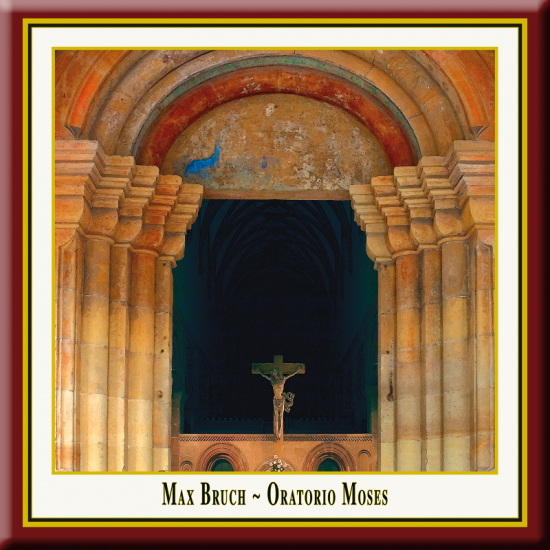




An excellent project and a grandiose performance
7. December 2015 - 15:37 — kuk-art.comThe aim of all this is to make the listener experience the intensity, not only of the music but of the occasion as well. Bruch's 'Moses', premiered in January 1895, is a truly eloquent and uplifting piece very much in the 'Elijah' tradition although I found the choral writing a hint Mendelssohnian. Apparently, Brahms did not think very highly of it but Bruch revealed that it was the fruit of inner strength that enabled him to complete this work.
I enjoyed the work immensely notwithstanding Brahms' advice and found much to savour in the memorable tunes that permeate the solo numbers with Moses' death particularly moving. Both soloists and choir rise magnificently to the occasion, delivering performances that are grandiose yet saturated with a humanity that was so evident in Israel's rapport with God.
The Russian Chamber Philharmonic play full bloodedly and with conviction under Jurgen Budday, who while keeping a tight reign on proceedings, allows the performance to flow with a natural ease.
An excellent project that deserves every plaudit for its unique Enterprise.
Gerald Fenech on Classical Net